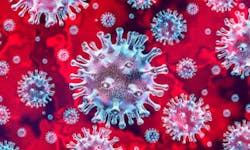Offshore staff
ABERDEEN, UK – Oil and Gas UK (OGUK) and UK safety organization Step Change in Safety have jointly produced two films that address the concerns of thousands of workers travelling offshore as the COVID-19 virus spreads.
The first film is co-presented by OGUK’s aviation advisor, Graham Wildgoose and Matt Rhodes of Bristow Helicopters UK and a member of the Step Change in Safety Leadership Team. Together they address aspects of helicopter travel such as operational procedures, arrival and departure protocols, and the transfer of passengers.
For the second film OGUK medical advisor, Dr Graham Furnace answers the workforce’s concerns around current coronavirus-related medical and health issues. Topics covered include temperature checking, measures to take when temperatures are high and self-isolation offshore.
OGUK chief executive Deirdre Michie and Step Change in Safety executive director Steve Rae said: “For many the new normal is working from home, but for thousands of people in our industry going to work means travelling by helicopter offshore to help meet our daily energy needs.
“The means by which we prepare for, and undertake, these journeys have had to change. These essential changes are by design intended to provide additional barriers to protect against the spread of this virus offshore, allowing us to continue to provide continuity of energy supply to support the vital work that all key workers are undertaking to protect the health and wellbeing of our nation.”
The films are available to view on both the Step Change in Safety and the OGUK websites.
OGUK HSE director Trevor Stapleton, speaking during a briefing yesterday, said his team had been working with Health Protection Scotland (HPS), which has produced guidelines for travel offshore. “We have made some suggestions and they have taken most of these on board,” he said.
HPS will shortly submit version 2 of its guidelines to OGUK for comment, and this will hopefully go live soon, Stapleton added.
Amongst other developments, OGUK has invited an offshore union representative to join its Panademic Steering Group, in order to convey any concerns offshore personnel might have.
Stapleton said numerous requests had been made for face masks but that, according to World Health organization guidelines, these are not mandatory and that there is no evidence that masks protect healthy offshore workers. Nor are they being recommended on helicopter flights to and from offshore installations.
Of greater importance is the need to ensure social isolation offshore and to focus on personal hygiene, he added. One helpful measure had been an increased move toward single-cabin occupancy, as operators minimize manning on offshore installations.
HPS too will issue more advice on practical self-isolation, he said.
OGUK has also been “banging the drum” for the UK government to ensure increased testing for COVID-19 at heliports and supply bases, Stapleton said. “Offshore workers should be regarded as critical for undergoing testing.”
The association is interested in both antigen (swab) and antibody (blood) tests, he said.
04/03/2020



